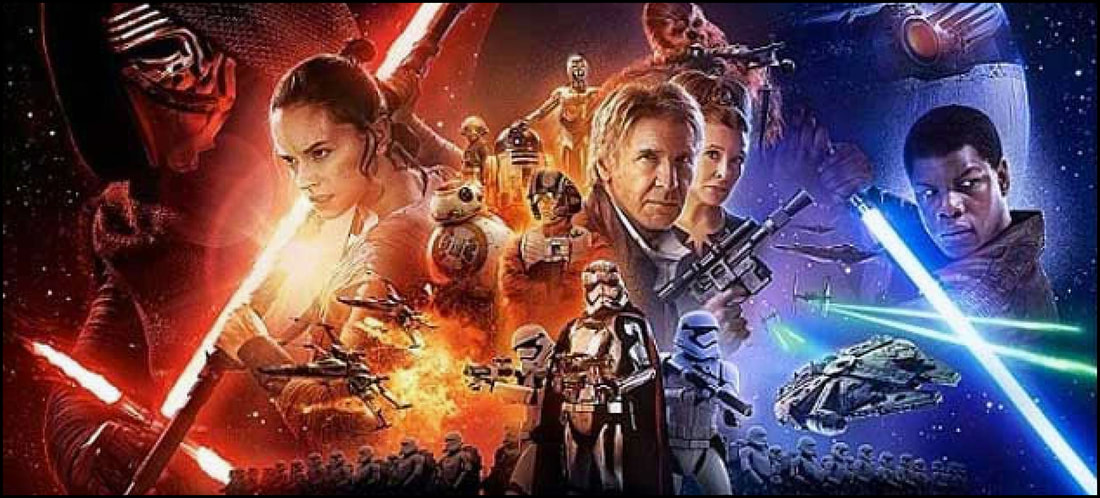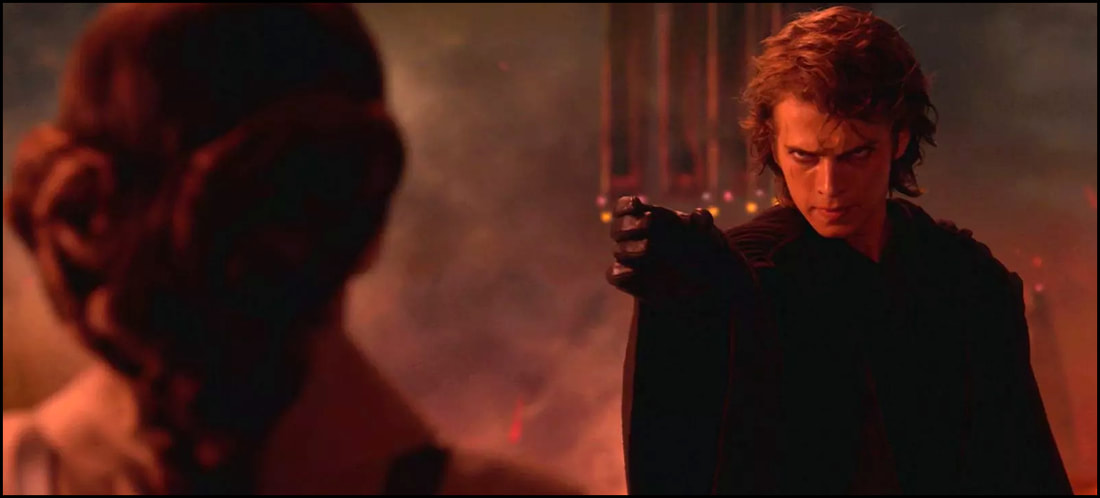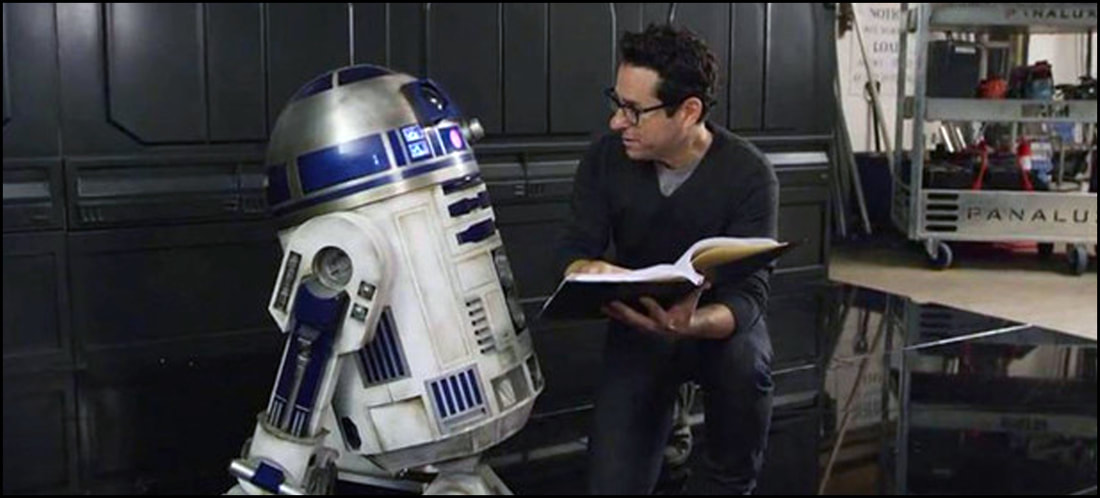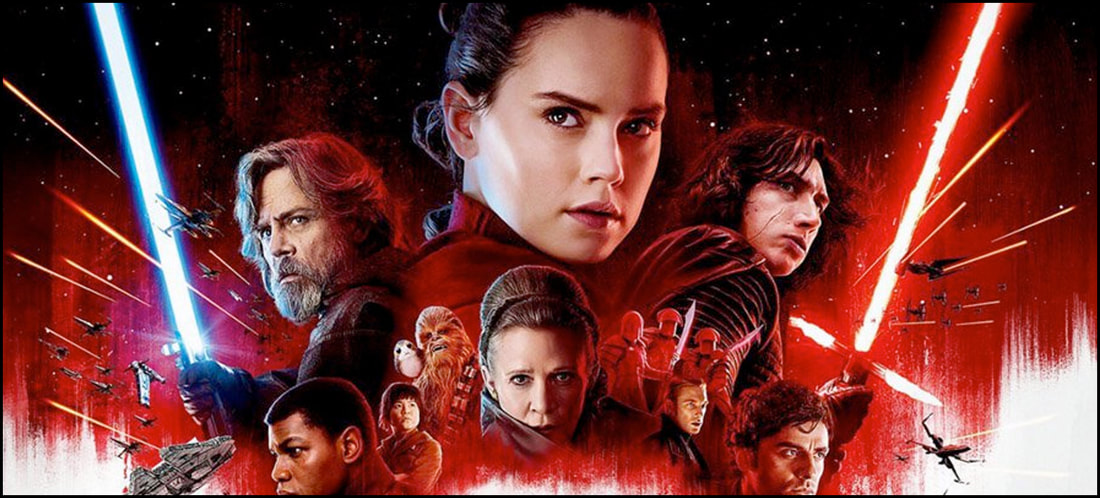Star Wars Films Post-Lucas:
Why They Fail ... Or Do They?
As some interviewees do, Lucas stumbled around his answer a bit, perhaps trying to give his reasoning greater nuance than was necessary. However, in no short order, he concluded by stating that all of the fun, all of the action, all of the really good conflict took place in this second trilogy. Furthermore, he believed he had a means with which to tell this group of stories with only modest exposition explaining what came before, and he concluded that audiences should have no trouble following what was basically an old-fashioned ‘good vs. evil’ space yarn.
On that premise, Lucas was right: his Original Trilogy (as its been called) stands largely on its own merits. (Don’t get me started on the ‘Special Editions’!) A New Hope launched audiences into space; The Empire Strikes Back kept them wanting more; and Return Of The Jedi – though it’s easily my least favorite of the three – still satisfyingly drew the galactic saga to a close, leaving our intrepid heroes swapping stories around the Yavin campfire with those God-awful, incapable-of-blinking Ewoks. Like most of my generation, I totally accepted the father/son conflict at the trilogy’s core, was thrilled with its resolution, and would be waiting for the day when the storyteller returned me to those distant worlds for the continuing adventures of Luke Skywalker and friends.
... And Now For Something Completely Different
Reactions were mixed, some of which is owed to what could arguably be called (ahem) ‘inferior storytelling choices’ by none other than Lucas himself. For starters, instead of having a villain as big, brash, and bold as Darth Vader, Lucas centered on politics (???) and some mystical skullduggery loosely tied to the Dark Jedi Order called the Sith. Think what you may of any political system, I’d argue that it’s hard to make national much less galactic policy all that interesting cinematically, especially considering the target audience was most likely the same demographic sought with the original films (namely: kids). Also, instead of serving up a clear hero on a hero’s quest Lucas spent time heavily focused on these worlds in conflict both internally and externally, letting his new and growing cast bob and weave as elegantly as possible between scenes heavy with exposition, some of which was provided in the broken, childish speech patterns of JarJar Binks. Eventually, it came to a head, and thankfully the director included the ‘Mother of All Lightsaber Fights’ to give fans something they had long anticipated: visual conflict played out spectacularly.
Send In The Clones
Anakin Skywalker was a bit older, and ObiWan Kenobi was only starting to take issue with his young padawan’s reckless disregard for the ways of safer Jedi. From the film’s start to finish, the duo consistently clashed in ways that properly hinted of the throwdown-to-end-all-throwdowns. And, naturally, who could resist the temptations of forbidden fruit? Anakin and Padme Amidala fell in love, perhaps a bit too easily for some but necessary if they were going to follow the path laid out for them by fate. Though Lucas’s political story still worked its way across the narrative, his heroes were given more heroics, from saving a senator from assassination all the way to subverting a secret plot to overthrow the Senate.
I’ve long argued that Episode II worked for me because it had a swashbuckling attitude. Anakin’s disregard for safety was often overplayed by Hayden Christensen, and Ewan McGregor’s Kenobi felt equally stiff if not overly sour at times: consequently, their pairing was balanced quite deftly. If only they had spent more of the motion picture together …
Sadly, stars Christensen and Natalie Portman’s lack of onscreen chemistry ground the film nearly to a halt. Too much of their relationship smacked of theatrical creation – a screenwriter’s invention – and not a legitimately realized love. Scenes left me asking not so much why Padme would fall for the Jedi-in-training instead of, say, taking a healthy nap. Their romantic scenes didn’t work for me the way I suspect Lucas intended, though I thought their pairing in the Geonosis arena was probably one of the film’s better achievements. Maybe theirs wasn’t a match made in celluloid Heaven, but I still wanted to see how this Romeo and this Juliet found tragedy rather than serenity.
A Damn Dark Finish
Toward Revenge’s closing, scenes were sprinkled almost a bit too mechanically, as if Lucas wanted to make certain he had tidied things up nicely despite the twenty-year-gap between Episodes III and IV. Although one might quibble over a choice here or there or the other, Revenge still culminated as its master had intended. The plot threads were woven to completion, with only a seed of rebellion planted.
Now, I’d never try to defend my position on the films or either of the trilogies. I’m old enough to fully grasp the reality that there’s good and bad in all stories. Whether or not I agree with Lucas’s choices as a storyteller is fundamentally irrelevant: the films were still made. Their copies will be around far longer than I will on this big blue marble. Creatively, this was his world. These are his characters. He can do with them what he pleases, and I suspect he did. Though I clearly prefer the Original Trilogy over the Prequel, I’m honest enough to admit that Episodes I, II, and III have plenty of elements I truly enjoyed discovering.
Where I have a bone to pick with the franchise is the direction of it after Lucas sold the mighty product to Walt Disney.
Up From The Ashes
The Force can do a lot of things … but awaken?!
Didn’t both the Original and the Prequel Trilogy heavily underscore that The Force was a living entity all its own? Weren’t we told that it surrounds us, binds us, penetrates us, etc.? It’s omniscient and omnipotent, and what a Jedi does is harness it to accomplish the things he or she does.
So how exactly could it go to sleep?
I realize that the Prequels somewhat softly redefined how The Force is used and who accesses it (to a degree), but my understanding was clearly homed in on the fact that it existed whether or not it any Force-user accessed it or how that was done. So why had The Force dozed off? What tired out a living field in the cosmos? How was that possible? And had JJ even seen Lucas’s earlier films?
Back To Square One
To worsen matters, apparently our original heroes wanted little to do with the galaxy.
Han and Leia had split up. Luke went off to only the Jedi Gods knew where. The droids? Well, R2 needed a recharge, and C3PO was replaced by BB-8. As fate (or JJ’s story) would have it, the galaxy hadn’t even really changed since Return of the Jedi’s climax: the Empire survived – just rebranded as First Order – so the Rebellion followed suit and set up shop as ‘the Resistance.’ (How fashionable!)
So far as I could tell, nothing truly had changed … so why WOULD the gang hang around any longer? All they fought for? All of their sacrifice? It amounted to squat, and audiences were right back where we started.
Much Ado About Nothing
To its credit, The Last Jedi does possess a central idea: failure. Failure is central to every plotline. (For those who didn’t believe it mirrored The Empire Strikes Back, I’d argue it did from start-to-finish much like The Force Awakens essentially copied A New Hope.) Writer/director Rian Johnson tinkers heavily with telling the audience to ruminate on failure, but for all of his characters’ posturing I’m not sure that I honestly understood what I’m to make of it. Sure, it’s pervasive. Sure, it’ll make your life hell. It may even make you think, say, or do some of the craziest things ever … but that’s it? That’s all I’m to take away … from a Star Wars motion picture?
When Luke Skywalker was defeated by Darth Vader in The Empire Strikes Back, there was this undercurrent of hope: you knew there’d be a rematch. You knew Luke would do what he could to save his friends and the galaxy at large from the Empire. He wouldn’t run away and hide on some distant planet to drown his sorrows in the milkshake of some alien beast.
Why not?
Well, because he was a hero on a hero’s quest, and that’s what heroes do. They come back. Contrarywise, the characters of the JJ Trilogy (as I’ve chosen to call it) have no quest other than one: survive. You can’t build a future on just surviving, and I’m honestly a bit shocked that Walt Disney seems to be building a franchise around it.
The Space Elephant In The Room
Honestly, as a viewer I’ve had no major qualms with those independent features. I don’t think either of them as the perfect example of a great Star Wars film, but it’s easier to accept their inherent strengths and weaknesses because they’re completed visions and not features continuing a greater saga but instead supplementing and expanding what we’ve already known. Each stand-alone has its own beginning, middle, and end. Knowing some of the greater Star Wars mythology they separately touch upon typically enhances the viewing experience rather than subtracts from it, and – while I could quibble with casting choices or set pieces – I don’t feel anything that Rogue One or Solo has done has hurt the broader franchise. Maybe time will prove me wrong. We’ll see.
the Force Remains Off-Balance
Here’s perhaps the bottom line: one could make a strong argument that all a movie studio would have to do is slap “Star Wars” onto the front half of any feature’s name and that flick is quite possibly destined to make money. (Yes, I’m aware of Solo: A Star Wars Story’s box office take, and who knows? That might prove to be the only exception to the rule at this point.) Essentially, there’s likely an audience for these films, and Disney’s investment in the entire Lucasfilm Empire is rock solid for a generation or two. Viewers will always wish to swept up to the galaxy far, far away; and the toys, books, games, shirts, pins, and other assorted merchandise will decorate your grandchildren and your grandchildren’s grandchildren lives.
I guess I’m old and just wishing for the way things used to be, maybe how they ought to be, namely a return to the days when heroes willingly took up the missions to vanquish evil from existence and set out to change the world. While saving what we love might be an admirable goal in today’s heavily PC culture, there inevitably comes a time when insuring what we love’s long-term survival means destroying evil once and for all. No Bantha bones about it.
As for burning books?
My Yoda would’ve known better.





 RSS Feed
RSS Feed